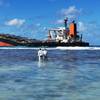Research Priorities Defined for the Arctic
The leading international Arctic research organisations have set common scientific objectives for the coming decade. The indigenous peoples of the Arctic were also involved in this process. Under the auspices of the International Arctic Science Committee (IASC), which is based at the Alfred Wegener Institute in Potsdam, they are about to submit a report that sets out the path for a jointly conceived and solution-oriented research agenda on the sustainable development of the Arctic and beyond.
The Arctic is the region on earth that reacts most sensitively and most quickly to changes in climate. However, what happens in the Arctic does not stay in the Arctic. The decrease in the sea ice cover, the thawing of the permafrost, snow and glaciers have an impact on the global climate system. Furthermore, growing economic and geopolitical interests in the Arctic do not just cause changes in the Arctic itself, but also far beyond its borders. "The goal of science has to be to generate knowledge and to pass it on to decision-makers, so that they can be prepared for these changes and not only react to them", says Dr Volker Rachold, Executive Secretary of the IASC at the Alfred Wegener Institute Helmholtz Centre for Polar and Marine Research (AWI).
The scientific report will be presented at the beginning of March at the summit meeting of Arctic researchers, the Arctic Science Summit Week – ASSW, in Fairbanks (Alaska). In addition to questions and focal points, the report will also show how science should tackle these issues. "As we developed the scientific objectives, three main priorities for future Arctic research clearly emerged", says Rachold. The first priority is to explore the role of the Arctic within the global climate, economic and geopolitical system. Secondly, the research organisations are planning to add better models and forecasts about future climate development in the Arctic and the impact on the Arctic eco-systems to their agenda. Thirdly, we need a better understanding of the vulnerability as well as the resilience of the Arctic environment and society as a scientific basis for the sustainable development of the Arctic.
A significant conclusion of the study was that, in order to achieve these goals, both the indigenous and local population of the Arctic and the other stakeholders must be involved in formulating the research questions. "We will set out the path for a jointly conceived and solution-oriented research agenda on the sustainable development of the Arctic and beyond", IASC Executive Secretary summarises.
The original report, "Integrating Arctic Research - a Roadmap for the Future" of the 3rd International Conference on Arctic Research Planning ICARP III is available for download at: http://icarp.iasc.info/










